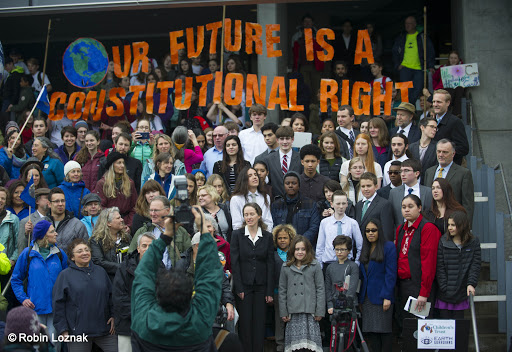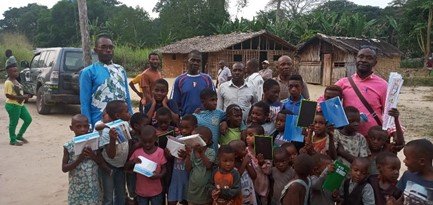WCEL Hosts Webinar on Climate Change Litigation in the Courts
On 5 June 2020, WCEL hosted the Webinar “Climate Change in the Courts”. The Webinar is the fourth event in the new WCEL Webinar Series.

Photo: Michael Gerrard
The Webinar “Climate Change in the Courts” provided an overview of the status quo of climate change litigation worldwide, including recent successes and lessons learned. Across the globe, climate change-related lawsuits are being filed against governments and corporate entities. While the cases vary in their legal reasoning, strategic character, and remedies sought, they are similar in that they are being brought in the absence of decisive legislative and administrative action on climate change.
The Webinar, moderated by Christina Voigt, Chair of the IUCN-WCEL Climate Change Specialist Group, and Professor at the University of Oslo, featured an international panel of distinguished legal academics and practitioners.
Joana Setzer, Assistant Professor, Grantham Research Institute on Climate Change and the Environment, London School of Economics and Political Science, presented on Global Trends in Climate Litigation. Professor Setzer observed there have been over 1,500 climate change cases filed in 34 countries and 9 regional or international jurisdictions over the past 30 years. While judges outside of the United States have been inclined to rule in favour of pro-regulation plaintiffs, judges within the United States have generally ruled against stronger climate action. Since 2016, however, it appears the trend in the United States has started to change, particularly in cases involving energy efficiency and renewable energy.
César Rodríguez-Garavito, Visiting Professor of Clinical Law, New York University School of Law, presented on Human Rights and Climate Litigation: A Global Assessment of the “Rights Turn”. He explained that a majority of the climate change cases that use human rights arguments have been filed since 2015 and that these cases tend to promote mitigation over adaptation. He identified the following emergent norms among the cases: (1) courts are extending the right to a healthy environment to include the right to a stable climate system; (2) courts are opining that governments do not have full discretion when setting and reviewing targets; (3) courts are recognizing that each country has a “fair share” of responsibility regardless of the actions of other countries.
Michael Gerrard, Professor and Director, Sabin Center for Climate Change Law, Columbia Law School, presented on Climate Change Litigation in the USA: Moving Beyond Statutes. He observed a majority of cases in the United States are brought under statutes, the most common being the National Environmental Policy Act, followed by the Clean Air Act and the Endangered Species Act. Professor Gerrard noted, however, that there are several lines of cases that do not rely on statutes, including cases brought under the public trust doctrine and the public nuisance doctrine. Additionally, a new emerging line of cases are being brought claiming failure to adapt to climate change.
Tessa Khan, Co-Director, Climate Litigation Network, A project of Urgenda Foundation, presented Looking ahead: What is Next for Climate Litigation? She observed that the forces that have brought climate change litigation to this point are only going to continue to grow, including advances in the science and the failure of formal political institutions to respond adequately to the climate crises. Ms. Khan proposed that in the coming years there are a number of issues that are likely to get increasing attention including accountability for extraterritorial impacts and how to hold states accountable for those greenhouse gas emissions that have escaped scrutiny under the UNFCCC. She indicated we are likely to see new industries as targets of litigation given the misalignment of their business model with climate emissions (e.g., plastic producers, agribusiness, etc.). Ms. Kahn concluded that litigators and the people driving these cases need to have a political strategy to effectively support their legal strategy.
The panel discussion was followed by a lively question and answers session in which the panelists had the chance to discuss further pressing issues around climate litigation. The engaged audience proposed a wide range of questions that reflected on the role of climate litigation in rebuilding a greener future after COVID-19, barriers in access to justice, the recognition of future generations’ rights, and strategic climate litigation cases, among others
Christina Voigt wrapped up the webinar by suggesting that courts have a significant role to play in the global fights against climate change and its adverse effects. Protecting the common and long-term interest in a safe and stable global climate system might be the most important role they have ever been asked to execute. The discussions today showed that courts and their judges are getting well prepared to take on this role.
She remarked that the webinar brought together judges, legal practitioners, civil servants and academics from many parts of the world who are united by a shared and urgent concern. As lawyers we are trained to work within a particular field. Law is an important lever in the climate fight, and environmental lawyers can contribute to solving this challenge upholding the environmental rule of law through different means, such as academic writing, teaching, practicing the law, law-making, rendering judgments, prosecution and enforcement.
A full recording of the Webinar is available here:
Become a WCEL Member and join the Climate Change Specialist Group here.



